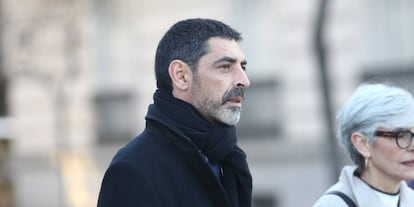High Court to try former chief of Catalan regional police for sedition
As well as Josep Lluís Trapero, two political figures and a Mossos officer will also be facing charges for their actions related to the illegal independence referendum and preceding events


Spain’s national High Court, the Audiencia Nacional, is to try the former head of the Catalan regional police, Josep Lluís Trapero, for criminal organization and sedition over the actions of the force – known as the Mossos d’Esquadra – relating to the illegal independence referendum in the region last October and events running up to it.
In the same writ, High Court Judge Carmen Lamela also stated that two former political chiefs of the Mossos, Pere Soler, the former director, and César Puig, ex-general secretary of the regional interior department, will also be tried for the same offenses. A Mossos officer from the Barcelona district of Eixample, Teresa Laplana, will also be tried for sedition. All four will appear before Judge Lamela on April 16.
The Mossos, the judge has found, stayed on the fringes of any of the National Police and Civil Guard operations
The judge is close to concluding the investigative stage of the judicial probe, and has been examining the role of the Mossos in the secessionist drive in the north-eastern Spanish region, which culminated on October 27 in the regional parliament with a declaration of independence, prompting the central government in Madrid to invoke Article 155 of the Spanish Constitution and suspend the region’s autonomous powers.
The Mossos, Lamela has found, stayed on the fringes of any of the National Police and Civil Guard operations, with behavior designed to “obstruct any actions that would get in the way of the strategic plan toward independence.” This was, she continues, following guidelines previously and publicly announced by the former regional interior minister, Joaquim Forn, who is currently in prison, as well as Pere Soler and César Puig.
In the case of the October 1 referendum, Lamela writes in her writ, the Mossos chiefs put in place a plan to avoid taking action to stop the vote going ahead, with “total inactivity.”
The judge also found that the suspects could have committed or abetted offenses of sedition “by omission”
Lamela considers that Trapero, Soler and Puig were part of a hierarchical organization, “under common direction at the top of which was the president of the Catalan government.” The latter is a reference to former Catalan premier Carles Puigdemont, who was sacked from his role by the central government under Article 155 and is currently under arrest in Germany awaiting possible extradition to Spain.
This “stable structure,” according to the magistrate, had the characteristics of a criminal organization: it was hierarchical, permanent and shared out defined roles and responsibilities.
The judge also found that the suspects could have committed or abetted offenses of sedition “by omission.” That refers to events on September 20 and 21, when crowds assembled in Barcelona outside the headquarters of the regional Economy Ministry to try to stop the Civil Guard from carrying out an operation aimed at stopping the independence referendum – which had been declared illegal by Spanish courts – from going ahead.

Their actions on that day, the judge wrote, “were an open refusal to the repeated requests for assistance that they received from the Civil Guard […].”
The judge has based her writ on evidence gathered during the investigative phase of the trial. Among this evidence is the so-called Enfocats document, which contained a road map toward independence and the role of different protagonists in the so-called “process” to break away from Spain.
English version by Simon Hunter.
Tu suscripción se está usando en otro dispositivo
¿Quieres añadir otro usuario a tu suscripción?
Si continúas leyendo en este dispositivo, no se podrá leer en el otro.
FlechaTu suscripción se está usando en otro dispositivo y solo puedes acceder a EL PAÍS desde un dispositivo a la vez.
Si quieres compartir tu cuenta, cambia tu suscripción a la modalidad Premium, así podrás añadir otro usuario. Cada uno accederá con su propia cuenta de email, lo que os permitirá personalizar vuestra experiencia en EL PAÍS.
¿Tienes una suscripción de empresa? Accede aquí para contratar más cuentas.
En el caso de no saber quién está usando tu cuenta, te recomendamos cambiar tu contraseña aquí.
Si decides continuar compartiendo tu cuenta, este mensaje se mostrará en tu dispositivo y en el de la otra persona que está usando tu cuenta de forma indefinida, afectando a tu experiencia de lectura. Puedes consultar aquí los términos y condiciones de la suscripción digital.








































